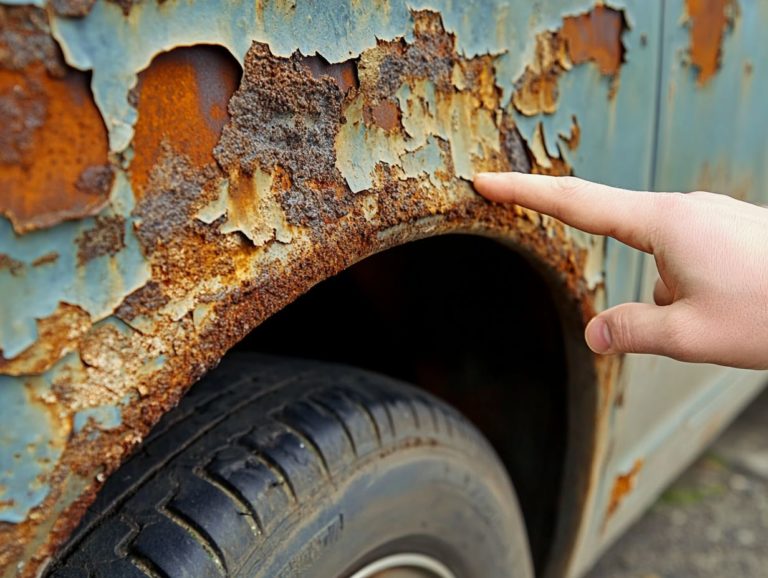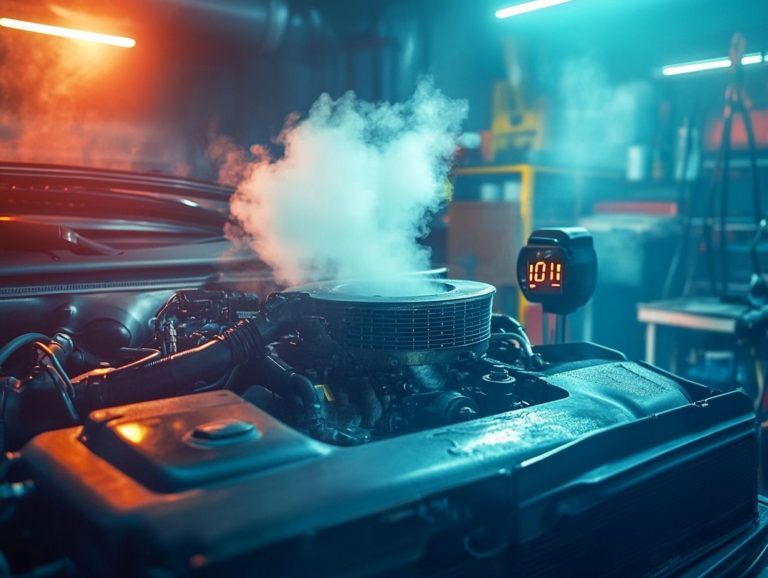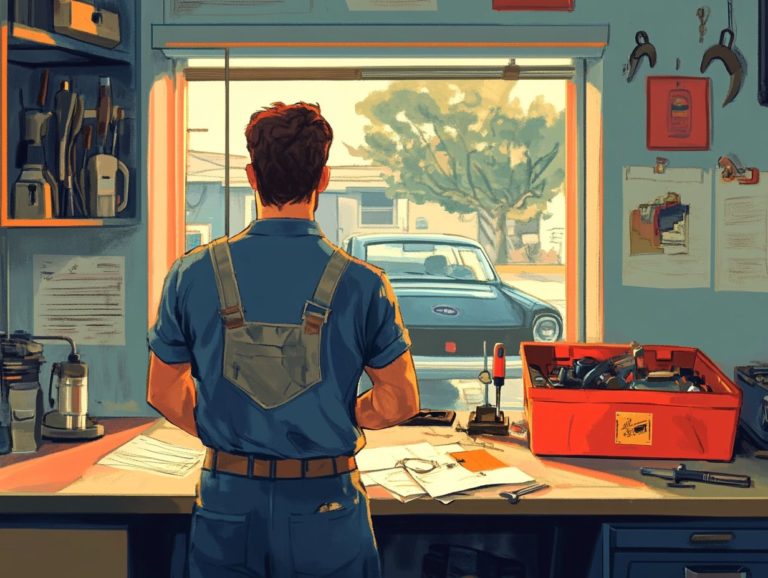How to Deal with Car Maintenance Costs?
Maintaining a vehicle can often feel like navigating through a complex financial maze. From routine services to unforeseen repairs, the costs can accumulate rapidly, leaving you wondering how to manage your expenses effectively.
Let s explore the key factors that drive car maintenance costs, highlighting common expenses you may encounter along the way. It also provides practical tips for minimizing those costs.
Whether you’re eager to save some money or simply want to feel more prepared for the road ahead, this guide empowers you to tackle car maintenance with confidence.
Contents
Key Takeaways:
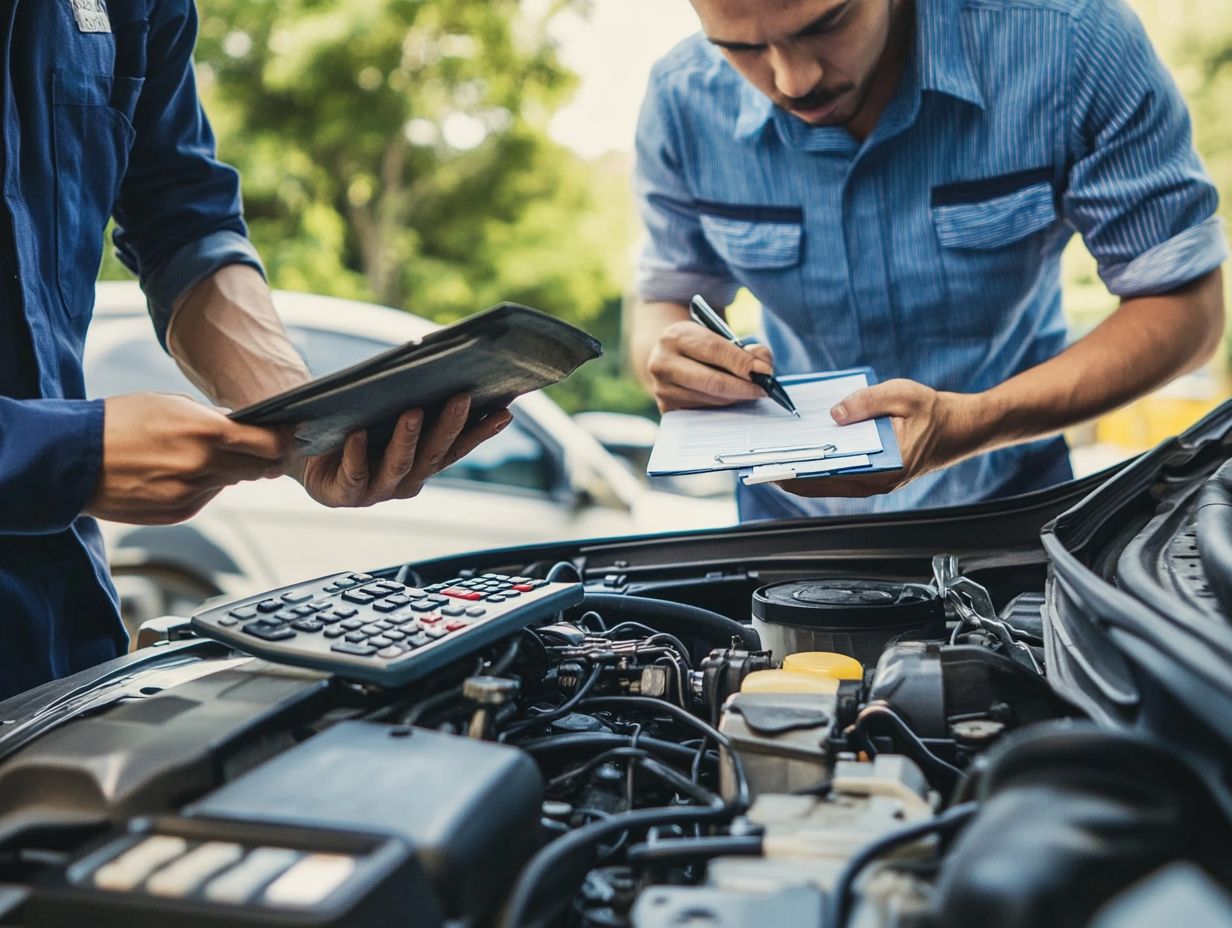
- Regular maintenance and care can help reduce car maintenance costs in the long run.
- Building an emergency fund can address unexpected expenses.
- Choosing a reliable vehicle can manage maintenance costs effectively.
Understanding Car Maintenance Costs
Understanding car maintenance costs is crucial for you as a vehicle owner. This knowledge allows you to budget effectively for long-term performance and learn how to manage common car repairs on a budget to minimize those pesky unexpected repairs.
Various factors, including routine maintenance, parts replacement, and technician fees, can significantly impact your overall ownership costs. Grasping the nuances of regular vehicle maintenance helps you make informed decisions.
By doing so, you empower yourself to avoid expensive repairs that can result from ignoring essential services. Knowing when to maintain your vehicle helps you create a sustainable car care strategy tailored to your needs.
What Factors Contribute to Maintenance Costs?
Several factors influence your car maintenance costs, including your driving habits, the type of vehicle you drive, and the intervals at which you perform maintenance. These elements can significantly affect your repair expenses and the overall performance of your vehicle.
If you tend to accelerate aggressively and brake suddenly, you’re not just putting stress on the engine; you’re also accelerating wear on your brakes and tires, leading to costly replacements sooner than you’d like.
The type of vehicle you own is crucial as well. Domestic cars may exhibit different wear patterns than those requiring oils made from chemical compounds, which often need specialized care.
Mechanics frequently recommend following manufacturer guidelines the recommendations found in your car s manual for scheduling regular check-ups. By adhering to these guidelines, you can better anticipate when maintenance is necessary, potentially shielding yourself from hefty repair bills in the future.
Common Car Maintenance Expenses
Common car maintenance expenses include a variety of routine services and parts replacements essential for maintaining your vehicle’s reliability and performance. Don’t wait until it s too late! Investing in these services will keep your vehicle reliable and safe.
Regular Maintenance Tasks and Costs
Routine maintenance tasks like oil changes, checking tire pressure, and replacing air filters are essential for keeping your vehicle running smoothly. The costs associated with these services can vary significantly based on the service providers and parts you choose.
For example, when it comes to oil changes, you might find prices ranging from $30 to $70, depending on whether you select standard or synthetic oil. While synthetic oils, which provide better engine protection, usually come at a higher price, they offer superior benefits. Tire pressure checks are frequently complimentary at service stations, making it easy to keep that in check. Replacing air filters typically costs between $15 and $30.
It s vital to follow the maintenance intervals recommended by your mechanic. Ignoring these guidelines can lead to premature wear on engine components and, ultimately, more costly repairs down the road. Regular maintenance not only extends the lifespan of your vehicle but also enhances its overall performance and safety.
Unforeseen Repairs and Expenses
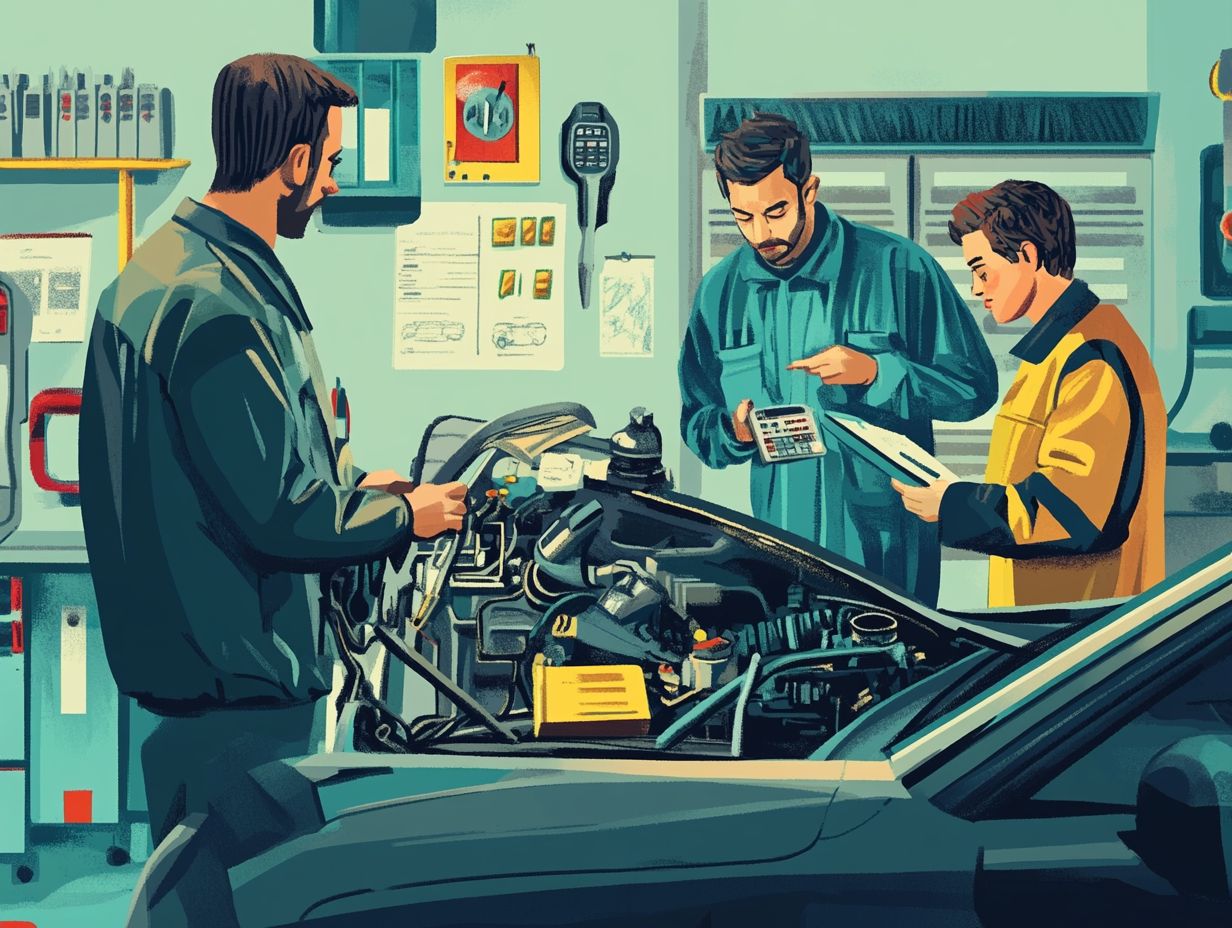
Unforeseen repairs can spring up from a variety of issues like battery failure, collisions, or significant wear and tear. These can lead to unexpected expenses that throw your budget into disarray.
Financial surprises often originate from components that wear out over time, such as brakes, tires, or even the engine. These issues demand sudden attention at the most inconvenient moments.
For many, covering these repair costs without a financial cushion creates undue stress. This underscores the importance of setting aside funds in an emergency car account.
Engaging in regular maintenance is essential for reducing the likelihood of unexpected incidents. By addressing minor issues before they escalate, you can extend the life of your vehicle and minimize the risk of larger, costly repairs.
Ways to Reduce Car Maintenance Costs
You can significantly reduce your car maintenance costs by embracing a blend of preventative maintenance, DIY repairs, and efficient car maintenance budgeting. These strategies save you money and enhance the long-term reliability of your vehicle.
Proper Maintenance and Care Techniques
Implementing proper maintenance and care techniques is crucial for enhancing your vehicle’s performance and longevity. This dramatically reduces the chances of unexpected repairs.
By scheduling regular inspections and ensuring timely oil changes, you keep your engine running smoothly. This also prevents unnecessary wear and tear.
Monitoring your tire pressure regularly boosts fuel efficiency and enhances road safety. By prioritizing these preventative maintenance practices, you extend your vehicle’s life and sidestep costly repairs stemming from neglect.
Adopting a proactive approach to vehicle maintenance can significantly lower your overall expenses. A bit of diligence today can lead to substantial savings down the road.
DIY vs. Professional Services
When considering car maintenance, you often find yourself at a crossroads between DIY repairs and professional services. Each option has its own advantages and disadvantages regarding maintenance costs and quality.
Choosing the DIY route can lead to substantial savings, especially for straightforward tasks like oil changes, air filter replacements, or tire rotations. With a few basic tools and a bit of research, you can tackle these jobs yourself.
However, the appeal of saving money diminishes when encountering complex issues like engine diagnostics which help identify problems in your engine s performance or fixing electrical issues, requiring specialized knowledge and tools.
In these situations, hiring a professional mechanic ensures the work is done accurately and grants you peace of mind. Professionals can often identify underlying problems that might slip past a novice s radar.
By understanding these scenarios, you can make informed choices based on your comfort level, available tools, and the specific demands of the repair.
Dealing with Unexpected Maintenance Costs
Facing unexpected maintenance costs? It can feel overwhelming! Implementing strategies like establishing an emergency car account and familiarizing yourself with how to stay prepared for common car repairs can significantly alleviate financial stress.
Creating an Emergency Fund
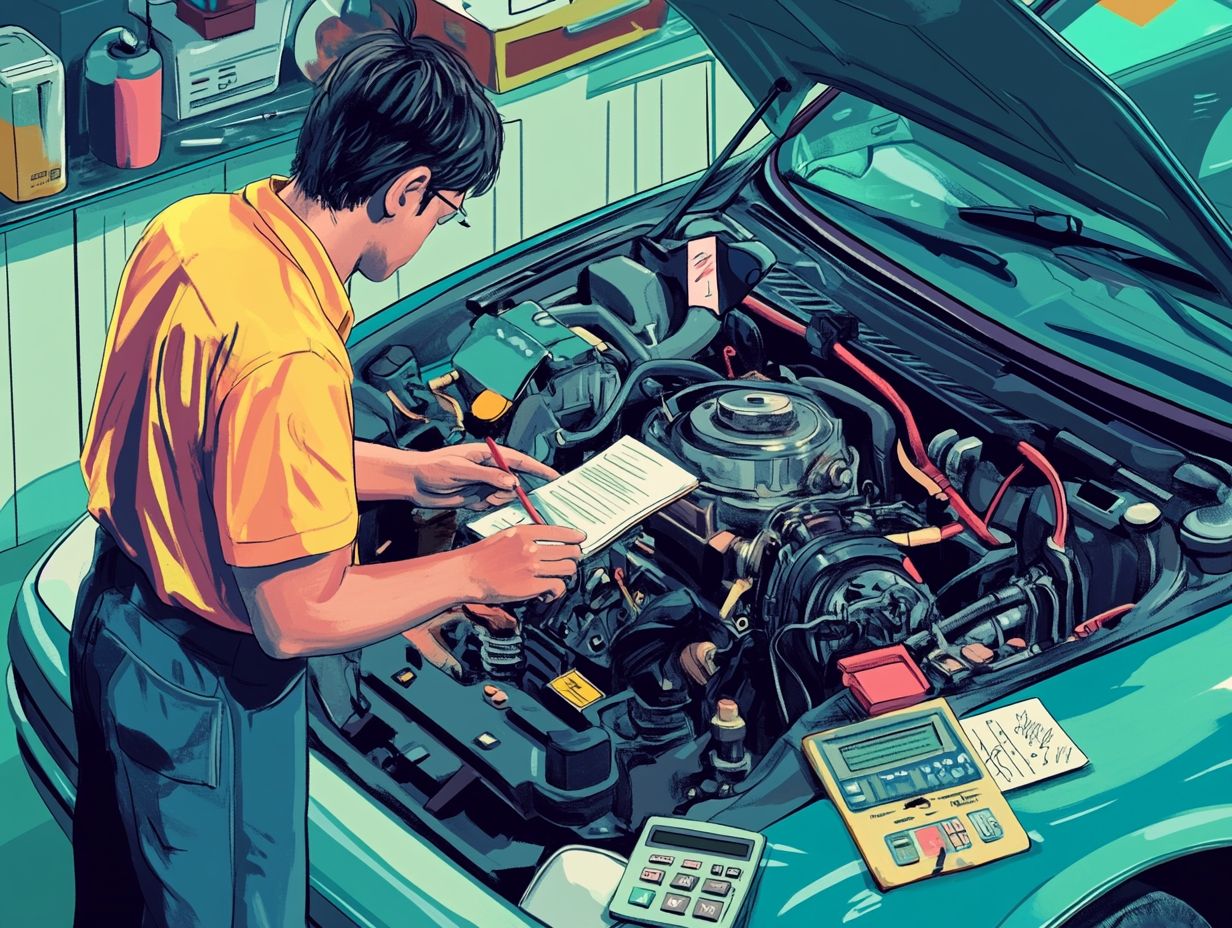
Creating an emergency car account is a savvy move to stay ahead of unexpected repairs and their associated costs. By setting up this fund, you can avoid scrambling for cash when a sudden breakdown hits.
The first essential step is to evaluate the average repair costs for common issues like brake replacements or engine repairs. Doing your homework on these expenses lays a solid foundation for figuring out an ideal savings target.
Aim for at least 3 to 6 months’ worth of potential repair costs. This will give you a substantial cushion. Making regular contributions to this fund, no matter how small, cultivates a sense of security, empowering you to navigate unforeseen circumstances without financial strain.
Alternative Transportation Options
Exploring alternative transportation options can be a smart choice for you as a vehicle owner, especially when faced with unexpected repairs or maintenance costs.
By considering alternatives like public transit, ridesharing, and carpooling, you can alleviate financial stress while enhancing your mobility. These options often come with lower costs compared to the traditional expenses of car ownership, allowing you to allocate your budget more effectively.
For instance, public transit systems offer affordable commuting solutions. Ridesharing and carpooling arrangements provide the flexibility you need for shared trips, particularly during peak times.
Planning your transportation strategy is essential. It can lead to smarter choices when weighing the costs of vehicle ownership against the savings from these alternative methods. With proper budgeting, you can make informed choices that pave the way for a more economical and efficient lifestyle.
Long-Term Strategies for Managing Car Maintenance Costs
Creating long-term strategies for managing car maintenance costs is essential for you as a vehicle owner. This approach helps you minimize expenses and emphasizes the importance of valuing regular car maintenance to ensure the reliability and longevity of your vehicle.
By taking a proactive stance, you can enjoy peace of mind and make informed decisions that benefit both your wallet and your ride.
Start planning today to save money tomorrow!
Choosing a Reliable Vehicle
Choosing a reliable vehicle is a crucial decision that significantly impacts your long-term maintenance costs and overall driving experience.
By prioritizing thorough research on vehicle reliability ratings, you can gain insights into how well a model stands the test of time. Look at manufacturer recommendations and owner reviews for genuine, real-world perspectives.
Understanding which vehicles boast a solid reputation for durability and low maintenance needs can lead to savings on repairs and a more enjoyable ownership journey. Opting for reliable vehicles means you ll likely encounter fewer unexpected expenses, allowing for greater peace of mind while navigating the open road.
Considering the Total Cost of Ownership
Considering the total cost of ownership is crucial for you as a vehicle owner; it s not just about the initial purchase price. You need to factor in ongoing maintenance costs and potential repair expenses.
These elements significantly impact your overall financial landscape, including insurance premiums that vary based on vehicle type and your driving history, along with fuel expenses that shift with market prices. Depreciation, or the decrease in value over time, plays a vital role in this equation, affecting your vehicle s resale value and shaping your financial decisions.
By evaluating all these components, you can make informed purchasing choices that align with your long-term financial goals. This ensures you select a vehicle that not only fits your budget but also suits your lifestyle needs.
Frequently Asked Questions
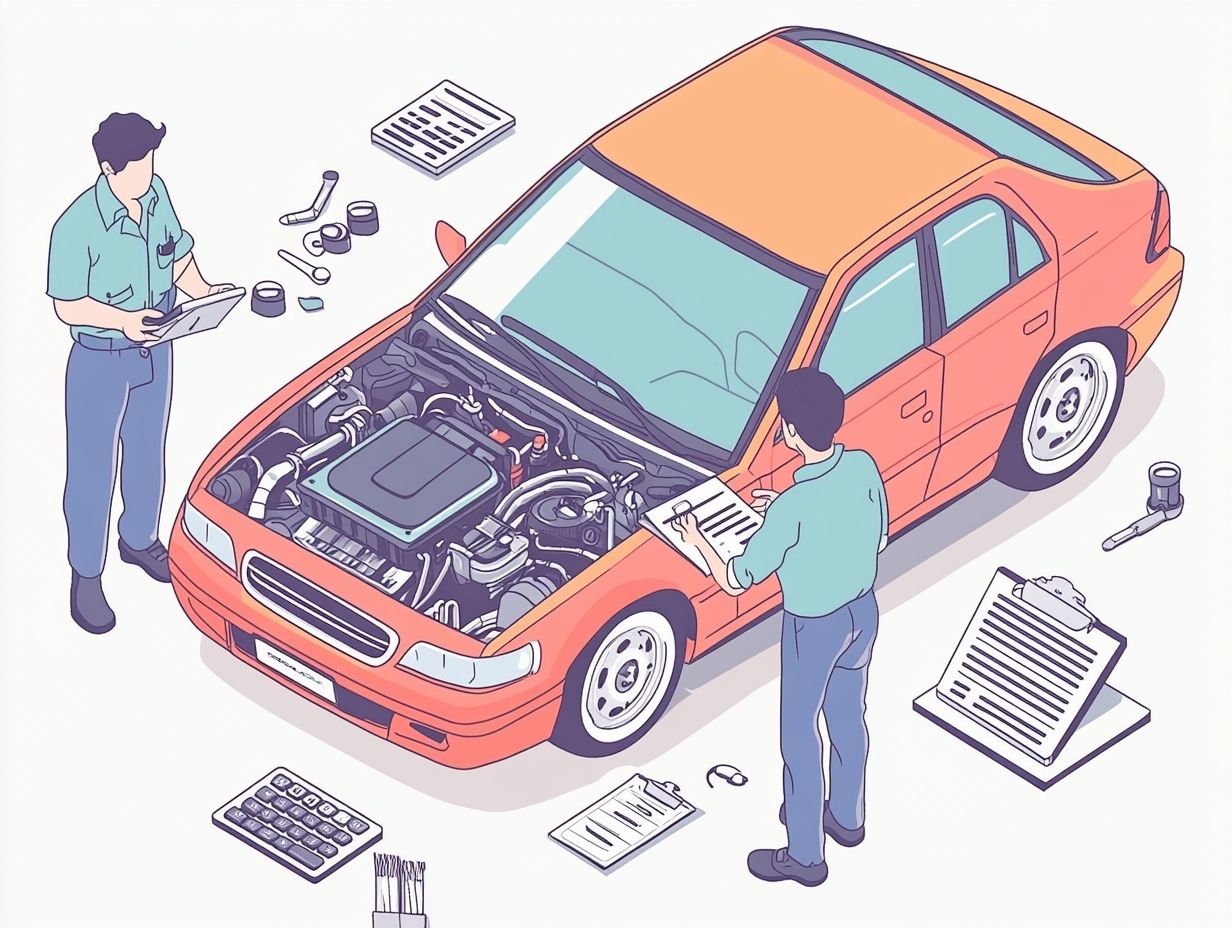
What are some ways to reduce car maintenance costs?
Regular maintenance helps you reduce car costs and can teach you how to handle car maintenance in a lease. Catching issues before they spiral into major and expensive problems is crucial.
- Learn to perform basic maintenance tasks yourself, such as changing the oil and air filter.
- Shop around for the best deals when purchasing parts or taking your car to a mechanic.
How can I save money on routine car maintenance?
Follow the recommended maintenance schedule outlined in your car’s manual. This helps prevent costly repairs in the future.
- Compare prices at different auto shops.
- Consider using coupons or discounts to lower costs.
What should I do if my car suddenly needs an expensive repair?
If your car suddenly needs an expensive repair, getting a second opinion from another mechanic is important.
- Ask about payment plans or financing options to make the cost more manageable.
- Research the issue online to see if it’s a common problem and if there are any cheaper alternatives for fixing it.
Should You Invest in Car Maintenance Insurance?
Car maintenance insurance, or extra coverage for repairs, helps cover unexpected costs. Whether it s worth it depends on your needs and the coverage details.
How to Budget for Car Maintenance
Set aside a specific amount each month for car maintenance. Track your car s service history to plan for future repairs, and having an emergency fund for surprises is a smart move.
How to Prevent High Car Maintenance Costs
Practice safe driving to avoid unnecessary wear and tear. Regular checks on fluids and tires help prevent costly issues later on.

